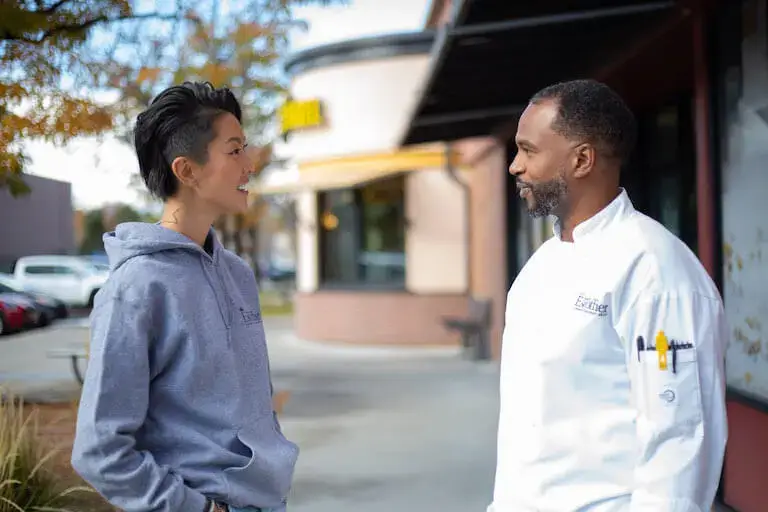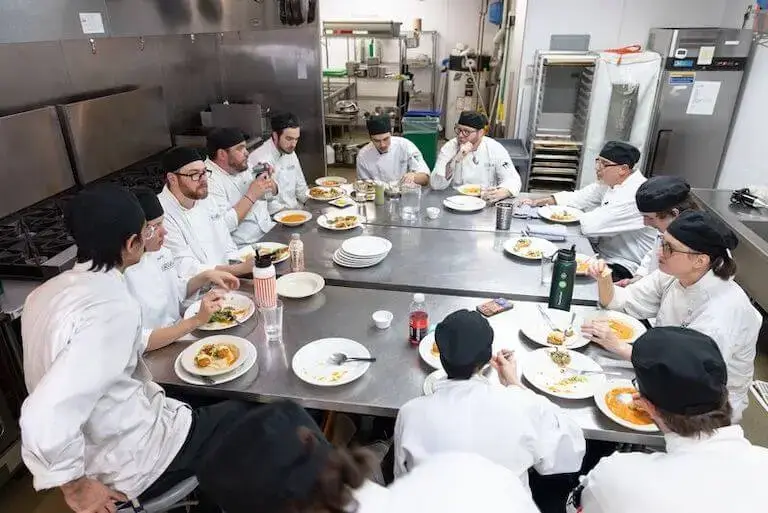Listen to This Article:
For many veterans, the transition to civilian life comes with a big question: What’s next?
Culinary school may not seem like an obvious next step. But when you look at the discipline, teamwork, and pressure that define both fields, the connection becomes clearer.
Read on to explore why so many veterans find a second mission in food.
Why Veterans Thrive in Culinary Careers
At first glance, military service and culinary arts might feel completely different. But think on it some more, and some common principles start to stand out.
Discipline, Teamwork, and Purpose in Both Fields
Culinary work calls for structure, discipline, and teamwork, the same kind of skills that military service also requires.
“I find that the kitchen is a natural place for people trained in the military to be comfortable,” said Chef Instructor Ryan Hodros, a former Navy intelligence officer. “Many of the conventions that chafe other students are second nature to the vet.”
According to the Warrior Allegiance, these qualities—teamwork, discipline, and ease with hierarchy—can translate well in kitchen environments where timing, organization, and accountability are essential.
Employers also recognize the value of veterans’ leadership under pressure. In a UMass Global survey, hiring managers identified veterans as top candidates for roles that require loyalty, performance under stress, and mission-driven collaboration.
Translating Tactical Skills to the Brigade System
Like the military, a professional kitchen runs on a clear chain of command. Orders are direct, roles are defined, and the stakes can be high. Veterans who are used to executing plans under leadership often find the rhythm of the kitchen familiar and manageable.
This connection isn’t accidental. Auguste Escoffier, often called the “father of modern cuisine,” drew on his own French military service when he developed the brigade de cuisine system. Modeled on military hierarchy, the brigade established defined roles, responsibilities, and reporting lines in the kitchen—principles that still structure professional kitchens today.
“There’s structure, attention to detail, sometimes a little chaos,” said Lance McWhorter, a veteran turned executive chef and owner of Heritage East at Culture ETX. “You feel at home on the line, like an extension of military life.”
In a column in Forbes, executive coach H.V. MacArthur notes that veterans bring discipline, composure, and teamwork to the civilian workforce. MacArthur adds that veterans come to the workforce after “years of obeying direct orders from their superiors,” and although she cautions that a corporate environment may not always “want or benefit from this high level of compliance,” kitchens are arguably a different space.
Value of a Mission-Focused Mindset
Military training emphasizes progress you can measure, real-time feedback, and staying sharp under pressure. That mindset can give veterans an edge in culinary school. Warrior Allegiance notes that veterans tend to perform well in structured learning environments with clear goals—much like culinary programs, which are hands-on, task-focused, and centered on building practical skills.
Instead of being discouraged by the steep learning curve, many veterans find they are motivated by it. Their ability to embrace repetition, apply feedback, and push through challenges can make them well-suited to succeed in both training and professional kitchen environments.
Quick Glance: Unique Skills Veterans Bring to the Kitchen
- Leadership & team cohesion
- Calm under pressure
- Adaptability on the line
- Strong work ethic & stamina
- Attention to sanitation and systems
Four Success Stories: Veterans Who Made the Culinary Leap
Data and shared values help explain why veterans often succeed in culinary careers, but the most powerful insights come from those who’ve made the transition themselves. Several Escoffier graduates and military veterans have shared their journeys on The Ultimate Dish, Escoffier’s podcast that spotlights culinary leaders, innovators, and changemakers.
Their stories highlight resilience, transformation, and how skills learned in service can translate to life in the kitchen.
1. Chef Chad White: “The kitchen runs parallel with the military”
After serving in the U.S. Navy as a recon scout, Chef Chad White found himself navigating the intense world of professional kitchens. What surprised him was how familiar it felt.
“The kitchen in general runs parallel with the military,” he said on the podcast. “From a brigade standpoint, a rank standpoint, discipline . . . You’re in a high-stress environment where things are happening around you rapidly.”
That overlap made it easier for him to thrive when others burned out.
“They weren’t performing the way I was performing,” he said, “so I was able to climb the ranks.”
Chef Chad, who appeared on Top Chef and now operates Trail Feast, also draws a direct connection between how military units operate and how he runs his kitchen.
“In the kitchen, I’ve trained my staff a certain way,” he said. “They all work the line, they communicate a certain way.”
The attention to detail includes things like cutting tape instead of ripping it.
“It’s not about how it looks; it’s about a standard,” he said. “If I can trust that you’ll cut the tape properly, I can trust that you won’t mess up a recipe that has fifteen steps to it, or a pick-up on the foie gras, which is a very delicate thing to prepare. If I know you have the attention to detail for the tape, I know you have attention to detail to either work a position in my kitchen, or manage the team that works in our kitchen. There’s a bit of the military.”
2. Tiffany Moore: “Are you limited by your mind? Or is your mind limitless?”
After sustaining a serious spinal injury during a U.S. Army deployment, Tiffany Moore was told she would never work in a kitchen. But Moore refused to accept that future.
“This is the only thing that I want to do,” she said on The Ultimate Dish. “I had to push past the limits of my mind to complete this goal that I’ve always wanted.”
When the VA declined Tiffany’s request to attend culinary school in person, a social media scroll led her to Escoffier’s online program.
“I said, ‘Wait a minute, what is this? Online culinary school?’ I filled out the information right there in the car… and by the time I got home… someone was calling me,” she said.
Moore graduated with honors in 2019, gave the commencement speech, and now leads a growing culinary brand—including her upcoming farm-to-table restaurant, Lola Pecan.
3. Trenin Nubiru: “Don’t ask for permission to be yourself”
After serving 20 years in the U.S. Army—first as a saxophonist in the Army Band and later as a communications officer—Trenin Nubiru retired with a deep desire to reinvent himself.
“I sat around for almost a year and a half trying to figure out who I was, what I’m supposed to do with all these new skills I have and how to repackage it,” he shared on the podcast.
That journey led Trenin to the kitchen. At Escoffier, he enrolled in and graduated from the Culinary Arts program, then did the same in the Baking & Pastry program, diving in with the same energy he had brought to his military service.
“I told myself, Day One, ‘I’m coming here. I’m open-minded. I want to learn absolutely everything,’” he said. His engineering background gave him an analytical edge, and his military training gave him the structure to push through complex technique work, especially in pastry and chocolate.
More than anything, Trenin found purpose in teaching and connection.
“I don’t talk to [younger students] about food; I talk to them about who they are,” he said. “What are you going for? What are your talents? Can I do that? Don’t ask for permission to be yourself.”

U.S. Army veteran and Escoffier student Trenin Nubiru chats with Escoffier Chef-In-Residence and Top Chef Host Kristen Kish.
4. Lance McWhorter: “[My restaurant is] me on a plate… it’s me on a soundtrack”
After serving in both the Army and Navy and working as a firefighter, EMT, and security contractor, Lance McWhorter returned from Iraq searching for purpose.
“I was just trying to figure out what was next in my chapter. Like, what did I really want to do, and cooking just kept coming up.”
That decision changed everything. Today, Lance is the executive chef and owner of Heritage East at Culture ETX in Tyler, Texas, a restaurant he calls “me on a plate . . . It’s me on a soundtrack. It’s Culture ETX, man.”
He said his military background shaped his leadership in the kitchen.
“My military bearing, my leadership skills, my business skills, my communication skills were better than most others,” he said.
But it was the fast-paced environment of the kitchen that helped him heal.
“The camaraderie, and the speed and the excitement, the intensity. If anybody watches ‘Chopped’ these days, you’ll hear a little sound bite that plays in all their commercials… ‘It’s fast, it’s hot, it’s loud.’ You’ll hear someone say that in the background and that’s me. They literally pulled that out when I’m talking about military service, transferring over the line.”
Real-World Results Empowered by Veteran Benefits
Benefits, scholarships, and grants can make a culinary education more accessible for veterans and active duty students.
Understanding GI Bill® and Military Aid Options
Escoffier accepts many types of military education benefits, including the Post-9/11 GI Bill®, Yellow Ribbon Program, and Tuition Assistance. Military grants of up to $1,000 are available for active duty and veterans, with additional support for spouses and dependents. A dedicated team can help students navigate the paperwork and explore funding opportunities.
*Information may not reflect every student’s experience. Results and outcomes may be based on several factors, such as geographical region or previous experience.
Military Friendly® School Status: Why it Matters to Service Members
For 2025-2026, Escoffier’s Boulder campus, including its online programs, has been designated a Military Friendly® School.
Scholarships for Veterans and Military Families
Beyond VA and DoD benefits, qualifying veterans, active duty service members, and their families may be eligible for institutional scholarships that can help cover remaining costs. These include the Student Veteran Scholarship, Military Grant, and Veteran Spouse/Dependent Grant, which can be applied toward any institutional expense, not just tuition.
Escoffier also offers broader scholarship categories such as the Institutional Scholarship, which can stack awards like the Spouse or Child of a Veteran, Passion Award, and Back to Class Scholarship (for online students). Explore scholarship and grant resources to see if you may qualify.

The kitchen is a team-first environment, much like the military.
Is Culinary School Right for Your Next Chapter?
Culinary school can be a powerful next step, but it’s not for everyone. If you’re weighing the decision, here are a few things to think about.
Questions to Consider Before Enrolling
Culinary school takes commitment, discipline, and a clear sense of purpose—qualities many service members already have. Before enrolling, you may want to consider: What do I want to create? Where do I want to lead? Am I ready to learn new skills and push through the challenges?
Why Online Culinary School Can be a Good Fit for Military Students
What works:
- Structured but flexible: Weekly deadlines and on-demand access can make it possible to balance coursework with other responsibilities.
- Chef-led and career-focused: Get direct instructor feedback, complete a real-world industry externship, and build skills with industry relevance.
- Veteran-friendly learning environment: Study alongside other adult students in a goal-driven, team-oriented space.
What to consider before enrolling:
- You’re your own boss: Culinary school requires time, grit, and self-motivation—especially online.
- Must love cooking: This is professional training, not casual cooking content.
- The ROI may take time: The culinary path can be rewarding, but it usually starts with long hours and can come with modest pay.

Online programs can offer flexibility for active duty and veteran students.
Career Pathways Beyond the Kitchen
Not every culinary grad works the line. Many Escoffier alumni have gone on to launch businesses, write cookbooks, work in food media, teach, or contribute to sustainable food systems. A culinary education can open the door to wherever food fits into your next mission.
Tools, Training, and Support for Life After Service
If you’re transitioning out of the military or planning your next chapter, culinary school might offer new opportunities in a familiar environment. Escoffier can offer flexible programs, veteran support, and a learning environment where discipline and teamwork matter.
Still weighing your options? Start by exploring more about how your GI Bill® benefits might apply, or connect with an admissions advisor who can walk you through what to expect.


